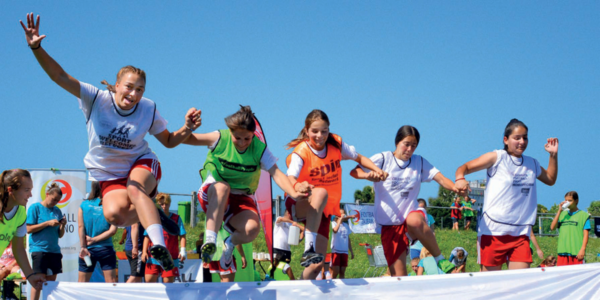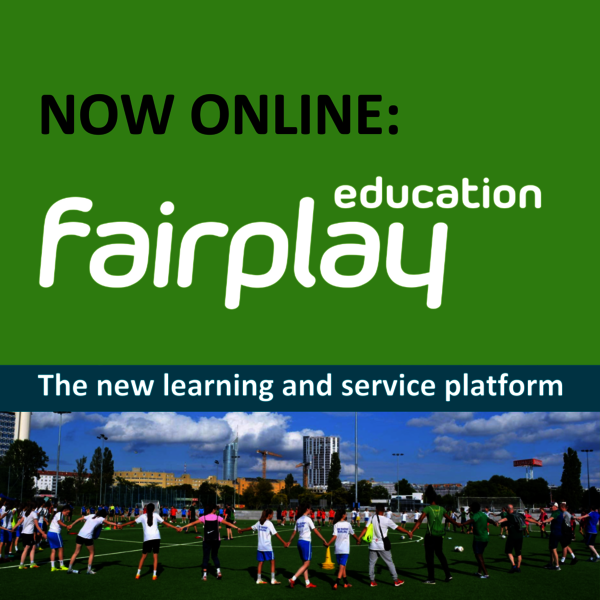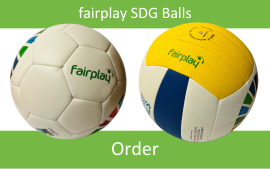United for Social Inclusion through Sport
Sport should be equally accessible for all in society. However, marginalized groups face barriers to participate in sport and physical activities. The newly established Sport Inclusion Network (SPIN) addresses barriers of refugees, migrants, and ethnic minorities, in particular women and girls. SPIN aims to make full use of sport as a means for social inclusion and integration.
Sport Inclusion Network invites groups
The SPIN network calls on sport clubs, associations, NGOs and minority initiatives to unite for social inclusion in and through sport and join the new network. A key focus of SPIN is to support, empower and capacity-build grassroots initiatives. By lending practical support to small groups and promote migrant and minority self-organisations, they can harness their potential as key agents for social change.
The Sport Inclusion Network (SPIN) has successfully operated on a European level as an informal network for more than a decade. In 2023, the seven founding organizations made a next logical step and registered SPIN as an international non-profit organization under Austrian law. This will open the network for organisations and groups in other parts of Europe such as the Western Balkans and in the Global South (e.g. sub-Sahara Africa).
SPIN board member Victoria Schwenzer from Camino in Germany said: “Everyone has the right to play sports - regardless of origin, age, gender and physical ability! SPIN is committed to equal access to sports for all and to making sports organisations more diverse so that everyone can participate and be heard. Our network is vibrant and committed - and we are looking for more organisations to join us in making sport more inclusive!"
Bella Bello Bitugu, Sport Director at the University of Ghana and SPIN board members: “The evolution and direction of modern sports with its complexities and focus on commercialization, winner takes all, influence and power means that certain groups and interests will be left on the journey. These are mainly the vulnerable, minorities, youth, girls and gender constructed groups, the prejudiced and stereotyped. It means therefore that sustainable and effective strategy towards, and for inclusion in sports is even more relevant now than ever, and thus calls for concerted and cross cutting action, participation and focus”.
International Board
In June the first SPIN board has been elected. The board members are Daniela Conti (Unione Italiana Sport Per tutti), Willie Westerhof (Huis voor Beweging, Netherlands), Jean-Marc Alingué (Liikkukaa Sport for All, Finland), Des Tomlinson (Football Association of Ireland – co-opted), Joaquim Evangelista (Sindicato dos Jogadores Profissionnais de Futebol, Portugal) and Bella Bello Bitugu (University of Ghana, Sports Directorate). Kurt Wachter (fairplay Initiative for Diversity and Anti-discrimination/ VIDC, Austria) and Victoria Schwenzer (Camino, Germany) are the chairpersons.
Following a period of consultation and round table meetings with stakeholders and grass-roots initiative a general assembly will be organized in 2024 to decide on the future direction of the network.
Call on new members
SPIN is addressing organization active in the field of sport and social inclusion to contribute to the work of SPIN and become a member. Benefits for members include being part of an international network that promotes inclusion in and through different sports, exchange of best practices with experts and practitioners, developing ideas for a more inclusive sport, networking events that connect members and increase our common impact, support for grassroots clubs and initiatives in building their capacity to offer inclusive sport and forging partnerships for collaborative projects under the Erasmus+ programme.
The following types of membership are available: 1) Organizational member (NGOs, grassroots initiative or sport clubs), 2) Supporter or Institutional member (sport governing bodies, associations, public institutions, companies) and 3) Individual member without voting rights. Membership fees are moderate allowing small groups or groups from poor countries to become members.
Track record of innovative project work across the EU
Since 2011, SPIN evolved into an informal network implementing a series of innovative initiatives, research and projects, including Sport Inclusion Network, ESPIN, Sport Welcomes Refugees, SPIN Women, SPIN Refugees, and the forthcoming SPIN Youth (2024-2026). Key tools which have been developed include a European Training Programme, which is a replicable workshop curriculum for coaches and trainers at local sport club level to foster inclusiveness and intercultural competence, accompanied by the Electronic Learning Environment (ELE). Publications include Action research, Study reports, Good Practice Guides and Toolkits. On sportinclusion.net, the main information and dissemination hub, Web Tools including a Self-Assessment Tool for Sport Clubs and the SPIN Connecting Tool.
For further information, visit www.sportinclusion.net.
Download the SPIN Info Folder here.
SPIN on social media:
Instagram * Facebook * Twitter
Hashtags:
#SPIN #SportInclusion #BeActive #SportWelcomesRefugees
Contact:
Stefan Belabed, Network Coordinator
Sport Inclusion Network (SPIN)
Möllwaldplatz 5/9, 1040 Vienna, Österreich
info@sportinclusion.net
www.sportinclusion.net




